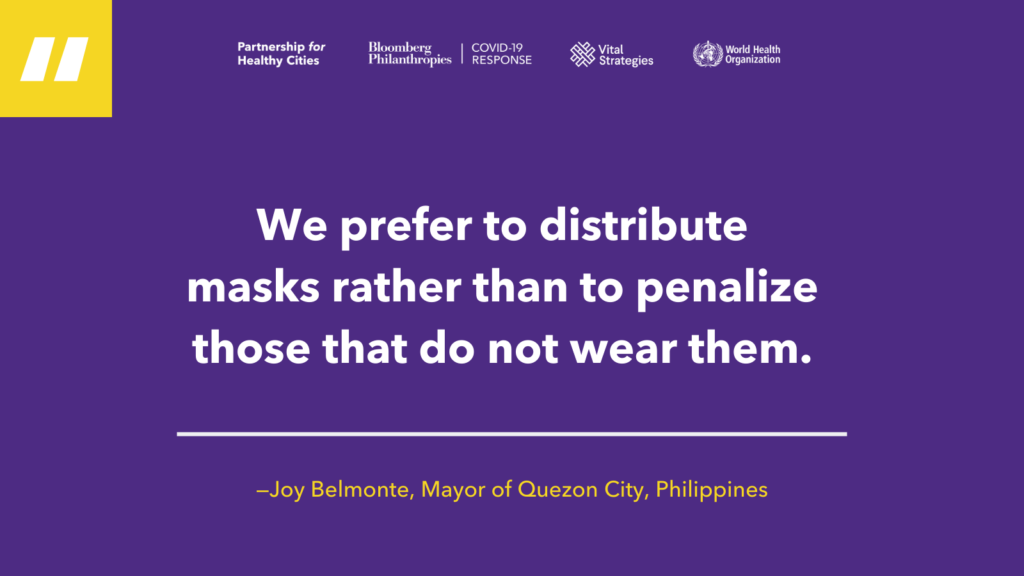Partnership for Healthy Cities webinars feature Executive Director of Human Rights Watch and the mayors of Quezon City, Philippines and Dakar, Senegal
With COVID-19 hitting cities hard and the situation evolving rapidly, global progress against COVID will demand informed urban response. This week, the Partnership for Healthy Cities webinar series focused on best practices for tightening and loosening public health and social measures (PHSMs)—statutes enacted to limit the virus’s spread such as requiring masks or physical distancing. A session for mayors addressed legal and ethical aspects of cities’ COVID-19 response, and a second session later in the week guided cities’ public health teams on the latest thinking about safely easing PHSMs going forward.
High-level representatives from 26 cities worldwide joined the mayors’ session on May 5, which featured guidance on taking a human rights-based approach to enforcing PHSMs. Kenneth Roth, Executive Director of Human Rights Watch, said that violations of citizens’ rights during the emergency are not just wrong, on principle, but also amount to bad public health—because the measures don’t work without community buy-in.
“The crisis has shown that officials who ignore human rights actually jeopardize our health, while those who respect human rights end up pursuing the wisest public health strategies.”
— Ken Roth, Executive Director of Human Rights Watch
Oscar Cabrera, Program Director of the Healthy Families Initiative at Georgetown University’s O’Neill Institute, echoed Roth’s remarks. He urged cities to be transparent in their COVID-19 decision-making, especially if those decisions are sure to cause economic and social strain. The risk without effective PHSMs, said Cabrera, is that the pandemic will last longer and be more deadly.
Mayors Joy Belmonte of Quezon City, Philippines, and Soham El Wardini of Dakar, Senegal, spoke next about their experiences handling these ethical and legal concerns. Mayor Belmonte addressed the webinar on the 50th day of a lockdown in her city, where the rate of infection appears relatively low but widespread testing is beginning to take place. She described the effects of the lockdown as “crippling” but opposes local calls for punitive enforcement of PHSMs. She has stepped in during instances of overreach, such as when police officers arrested market vendors operating in a restricted area and students distributing food in poor communities without a permit. Mayor Wardini stressed the importance of supporting vulnerable groups for whom restrictive public health measures have proven too much of a struggle. In Dakar’s case, that has meant offering shelter to street children and providing supplies to local families to soften the impact of shopping restrictions.

The technical arm of the webinar series continued on May 7 with an introduction to Safely Easing Social Measures for public health teams. Twenty-six cities participated for this topic, of great interest in many regions of the world as urban areas begin to lift, or consider lifting, PHSMs in their jurisdictions.
Dr. Cyrus Shahpar, Director at Resolve to Save Lives, a Vital Strategies initiative, listed four key principles for cities trying to determine next steps:
- Use data to inform your decisions.
- Remember that loosening or tightening PHSMs happens in stages.
- Cities should relax slowly but be ready to tighten restrictions again.
- Coordinate with national and subnational governments.
In making the decision about which measures to loosen or tighten, Dr. Shahpar doubled down on the need to monitor a variety of data: epidemiologic, health care system resilience, public health capacity and social and economic indicators. Vulnerable populations must be protected during the transition, and cities should plan to release sector-specific guidance to their populace.
“Loosening interventions, or even tightening them, is not an on/off switch—it happens in stages.”
— Cyrus Shahpar, Director, Resolve to Save Lives
Dan Kass, Senior Vice President at Vital Strategies, closed the Thursday session by championing the use of local and subregional data about COVID-19 infection rates and urging public health decision-makers to lean on it when deciding whether to loosen or tighten PHSMs. He cited “doubling times” in particular as a useful measure of how rates are changing in a particular area and recommended that cities also study data on neighboring areas, especially those with similar social and economic situations.
The webinar series continues on May 12 with a session for mayors on safely easing social measures and on May 14 with “Protecting Vulnerable Populations” for COVID-19 city responders. For webinar recordings and additional tools, explore the Partnership for Healthy Cities COVID-19 Response Center at: www.cities4health.org
About the Partnership for Healthy Cities:
The Partnership for Healthy Cities is a prestigious global network of cities committed to saving lives by preventing noncommunicable diseases (NCDs) and injuries. Supported by Bloomberg Philanthropies in partnership with WHO, as well as Vital Strategies, this initiative enables cities around the world to deliver a high-impact policy or programmatic intervention to reduce NCDs and injuries in their communities. For more information, visit: https://partnershipforhealthycities.bloomberg.org/
The Partnership for Healthy Cities COVID-19 Response is part of the $40 million Bloomberg Philanthropies COVID-19 Global Response Initiative. By collaborating with the WHO and Resolve to Save Lives, an initiative of Vital Strategies, the Partnership for Healthy Cities COVID-19 Response is working hand-in-hand with the world’s leading experts on epidemic prevention.